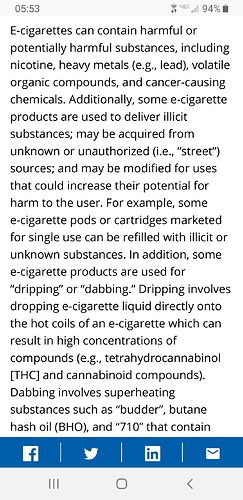Here we go!!!
MDHHS Healthcare Advisory 8-29-2019:
Severe respiratory pulmonary disease associated with e-cigarette/vaping use
The Michigan Department of Health and Human Services (MDHHS) is currently investigating six cases of severe pulmonary disease associated with e-cigarettes/vaping/dabbing. All cases have been reported in Michigan’s Lower Peninsula and most of the individuals have been hospitalized for severe respiratory illness. The age range of the cases is 19-39 years. As of August 27, 2019, 215 possible cases of severe respiratory disease associated with e-cigarette/vaping use have been reported in 25 states. As a result, MDHHS is providing this update to all hospital emergency departments, healthcare providers, hospitals, medical examiners, clinics and EMS providers. MDHHS is also requesting that providers report patients with severe pulmonary disease associated with e-cigarettes/vaping/dabbing, with or without THC (tetrahydrocannabinol), to their Local Public Health Department.
Clinical presentation:
Symptoms experienced by confirmed cases include cough, shortness of breath, chest pain, fatigue, and fever. Other reported symptoms include weight loss, nausea, abdominal pain, and diarrhea.
In previously reported cases, symptoms generally worsened over a period of days to weeks before hospital admission. Chest radiographs have shown bilateral opacities (often in the lower lobes) and CT images have shown diffuse ground glass opacities. Some cases have improved with systemic steroids; some required endotracheal intubation. Note: a copy of the CDC’s “case classification” criteria is attached, for your information.
Management :
Currently, it is unknown what is causing and contributing to the symptoms. Infectious etiologies should be ruled out, at a minimum by respiratory viral panel and influenza PCR or rapid test information. Further testing may be indicated e.g., urine antigen for Streptococcus pneumoniae and Legionella, sputum cultures if a productive cough, bronchoalveolar lavage (BAL) cultures if done, blood cultures, fungal tests or culture, or HIV-related opportunistic respiratory infection tests, etc. Aggressive supportive care is warranted, and in severe cases, it is recommended that pulmonary and critical care specialists are consulted.
What is being done to prevent this problem? CDC and FDA are working with state partners to investigate all associated cases to determine the etiology of these illnesses.
How can health care providers help with prevention and investigation efforts?
1. Report all patients with severe pulmonary illness associated with use of e-cigarettes, vaping devices, or dabbing devices to the local health department, listed at www.michigan.gov/mdhhs/0,5885,7-339-73970_5461_74040—,00.html
The following information should be reported: patient’s name, date of birth (if unknown, age), city/town of residence (or county if known), reporting provider’s name, phone number, email.
2. If available, please collect and hold all devices or substances used, including electronic nicotine delivery systems, vaping or dabbing devices and substances/solutions, from the patient so that they can be sent for laboratory testing if requested by public health.
If Local Public Health determines that the devices or substances should be tested, they will contact you and will handle collection and sending of products to the lab.
If you have questions about contacting your local health department, please reach out to your hospital’s Infection Preventionist.
*** This alert is being sent to: Local Public Health, Hospitals, Physicians and Clinics, EMS Roles, Regional Epidemiologists, Medical Examiners, and Regional Healthcare Coalitions ***
Please forward this information to others as applicable.
Thank you,
Michigan Health Alert Network
And a CDC Draft. Both being circulated to emergency response units as well as health care providers.
Severe Pulmonary Disease Associated with E-cigarette Use Outbreak Case Definition (CDC) - August 26, 2019
Confirmed Using an e-cigarette (“vaping”) or dabbing* in 90 days prior to symptom onset AND Pulmonary infiltrate, such as opacities on plain film chest radiograph or ground-glass opacities on chest CT AND Absence of pulmonary infection on initial work-up: Minimum criteria include negative respiratory viral panel, influenza PCR or rapid test if local epidemiology supports testing. All other clinically indicated respiratory ID testing (e.g., urine Antigen for Streptococcus pneumoniae and Legionella, sputum culture if productive cough, bronchoalveolar lavage (BAL) culture if done, blood culture, HIV-related opportunistic respiratory infections if appropriate) must be negative AND No evidence in medical record of alternative plausible diagnoses (e.g., cardiac, rheumatologic or neoplastic process). Probable Using an e-cigarette (“vaping”) or dabbing* in 90 days prior to symptom onset AND Pulmonary infiltrate, such as opacities on plain film chest radiograph or ground-glass opacities on chest CT AND Infection identified via culture or PCR, but clinical team** believes this is not the sole cause of the underlying respiratory disease process OR Minimum criteria to rule out pulmonary infection not met (testing not performed) and clinical team** believes this is not the sole cause of the underlying respiratory disease process
AND No evidence in medical record of alternative plausible diagnoses (e.g., cardiac, rheumatologic or neoplastic process).
Footnotes * Using an electronic device (e.g., electronic nicotine delivery system (ENDS), electronic cigarette, e-cigarette, vaporizer, vape(s), vape pen, dab pen, or other device) or dabbing to inhale substances (e.g., nicotine, marijuana, THC, THC concentrates, CBD, synthetic cannabinoids, flavorings, or other substances). **Clinical team caring for the patient.



